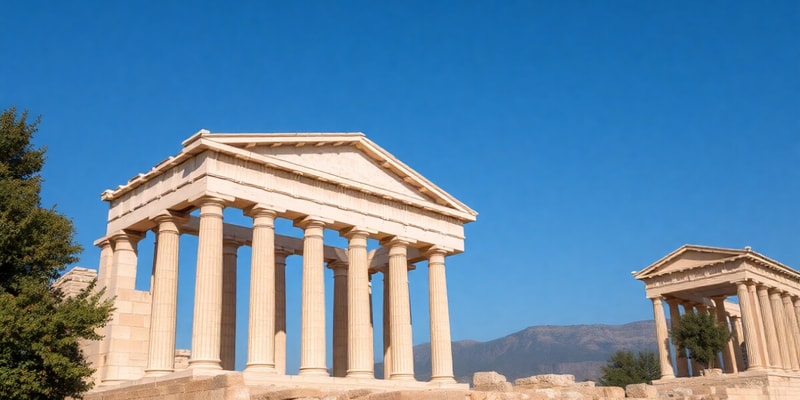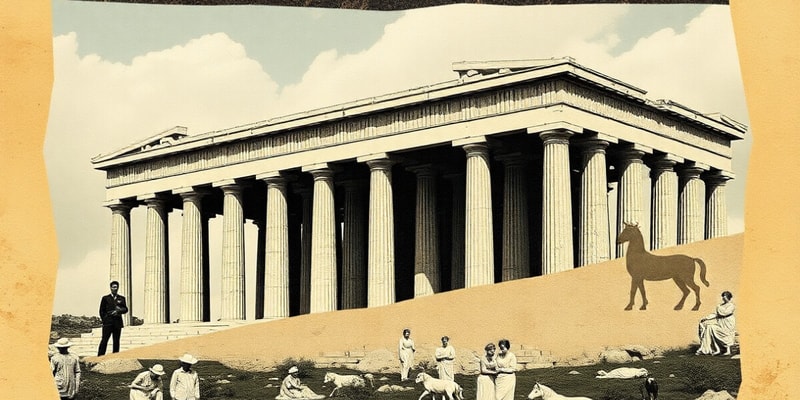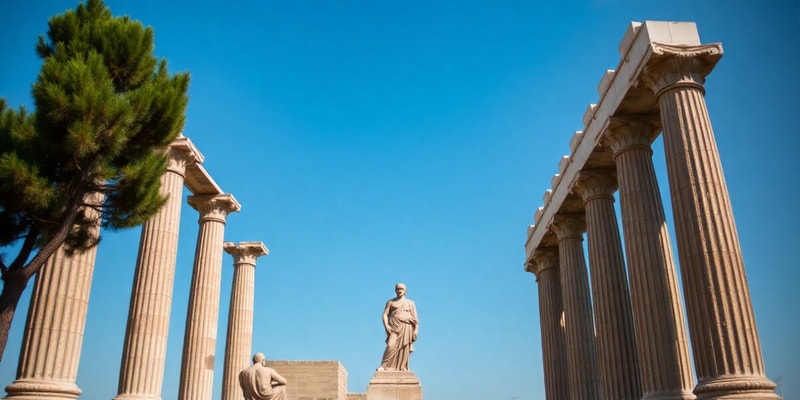Podcast
Questions and Answers
What event marked the end of the Hellenistic Period?
What event marked the end of the Hellenistic Period?
Which general reestablished the Antigonid Dynasty in Greece?
Which general reestablished the Antigonid Dynasty in Greece?
What was the significance of the Battle of Pydna in 168 BCE?
What was the significance of the Battle of Pydna in 168 BCE?
During the Hellenistic Period, which of the following was an influence of Rome on Greece?
During the Hellenistic Period, which of the following was an influence of Rome on Greece?
Signup and view all the answers
What title did Octavian Caesar hold after becoming the ruler of Rome?
What title did Octavian Caesar hold after becoming the ruler of Rome?
Signup and view all the answers
Which ancient Greek philosopher is recognized for developing the concept of an atomic universe?
Which ancient Greek philosopher is recognized for developing the concept of an atomic universe?
Signup and view all the answers
Which of the following ancient Greeks is known for pioneering early work in physics and engineering?
Which of the following ancient Greeks is known for pioneering early work in physics and engineering?
Signup and view all the answers
What significant cultural aspect was influenced by the geography of Greece?
What significant cultural aspect was influenced by the geography of Greece?
Signup and view all the answers
From which civilization did the Latin alphabet derive after its introduction to Greece?
From which civilization did the Latin alphabet derive after its introduction to Greece?
Signup and view all the answers
What percentage of Greece is covered by mountains?
What percentage of Greece is covered by mountains?
Signup and view all the answers
Which of the following is NOT one of the main island groups of Greece?
Which of the following is NOT one of the main island groups of Greece?
Signup and view all the answers
Who is considered the father of Western philosophy among the ancient Greeks?
Who is considered the father of Western philosophy among the ancient Greeks?
Signup and view all the answers
What notable political concept is believed to have originated from ancient Greece?
What notable political concept is believed to have originated from ancient Greece?
Signup and view all the answers
What civilization is known for developing a writing system known as Linear A?
What civilization is known for developing a writing system known as Linear A?
Signup and view all the answers
Which period is characterized by permanent settlements and the domestication of animals in ancient Greece?
Which period is characterized by permanent settlements and the domestication of animals in ancient Greece?
Signup and view all the answers
Which natural disaster is often cited as a significant factor for the fall of the Minoan Civilization?
Which natural disaster is often cited as a significant factor for the fall of the Minoan Civilization?
Signup and view all the answers
What is the correct chronological order of the following civilizations?
What is the correct chronological order of the following civilizations?
Signup and view all the answers
Which ancient Greek poet's works reflect the culture of the Mycenaean Civilization?
Which ancient Greek poet's works reflect the culture of the Mycenaean Civilization?
Signup and view all the answers
Eurynome, the Great Mother Goddess, is primarily associated with which aspect of creation in Greek mythology?
Eurynome, the Great Mother Goddess, is primarily associated with which aspect of creation in Greek mythology?
Signup and view all the answers
What role did King Minos play in the context of ancient Greek history?
What role did King Minos play in the context of ancient Greek history?
Signup and view all the answers
The transition from a matriarchal religion to a patriarchal paradigm in ancient Greece is primarily reflected in the changes of which story?
The transition from a matriarchal religion to a patriarchal paradigm in ancient Greece is primarily reflected in the changes of which story?
Signup and view all the answers
Which geographical area was primarily agriculturally productive for early inhabitants of northern Greece?
Which geographical area was primarily agriculturally productive for early inhabitants of northern Greece?
Signup and view all the answers
What is the designation of the writing system associated with the Mycenaean Civilization?
What is the designation of the writing system associated with the Mycenaean Civilization?
Signup and view all the answers
Which of the following best describes the primary content of Linear B script tablets?
Which of the following best describes the primary content of Linear B script tablets?
Signup and view all the answers
What significant cultural change began during the Archaic Period of Greece?
What significant cultural change began during the Archaic Period of Greece?
Signup and view all the answers
Who is recognized as the first Greek philosopher to engage in scientific inquiry?
Who is recognized as the first Greek philosopher to engage in scientific inquiry?
Signup and view all the answers
What was the outcome of the first conflict during the Peloponnesian Wars?
What was the outcome of the first conflict during the Peloponnesian Wars?
Signup and view all the answers
In which year did the Battle of Salamis, a pivotal victory for Athens, occur?
In which year did the Battle of Salamis, a pivotal victory for Athens, occur?
Signup and view all the answers
What was the main purpose of the Delian League formed by Athens?
What was the main purpose of the Delian League formed by Athens?
Signup and view all the answers
What best describes the educational influence of Aristotle on Alexander the Great?
What best describes the educational influence of Aristotle on Alexander the Great?
Signup and view all the answers
Which city-state formed the Peloponnesian League as a response to Athenian dominance?
Which city-state formed the Peloponnesian League as a response to Athenian dominance?
Signup and view all the answers
What marked the beginning of the Classical Period in Greek history?
What marked the beginning of the Classical Period in Greek history?
Signup and view all the answers
What was one significant characteristic of Greek art during the Classical Period?
What was one significant characteristic of Greek art during the Classical Period?
Signup and view all the answers
Study Notes
Ancient Greece: A Summary
-
Geographic Location: Southeast Europe, consisting of a mainland and islands (archipelago). Surrounded by the Mediterranean, including the Aegean and Ionian Seas, with extensive mountain ranges.
-
Ancient Greek Contributions: Birthplace of Western philosophy (Socrates, Plato, Aristotle), literature (Homer, Hesiod), mathematics (Pythagoras, Euclid), history (Herodotus), drama (Sophocles, Euripides, Aristophanes), the Olympic Games, and democracy. Also developed the scientific method (Thales of Miletus), atomic theory (Democritus, Leucippus), the Latin alphabet (introduced during Phoenician colonization), and early physics and engineering (Archimedes).
-
Impact of Geography: Limited natural resources, mountainous terrain, and proximity to water led to seafaring, trade, and colonization (islands and Anatolia/Asia Minor).
-
Etymology of "Hellas": Derived from Hellen, the son of Deucalion and Pyrrha, figures in Ovid's account of the Great Flood.
-
Minoan Civilization: Flourished on Crete (2700-1500 BCE), dominated regional sea power, and developed Linear A writing. Likely fell due to volcanic eruption on Thera/Santorini (between 1650 and 1550 BCE) causing a tsunami and land overuse. Possibly influenced by the myth of Atlantis.
-
Mycenaean Civilization: (approximately 1900-1100 BCE) Considered the origin of Greek culture, with strong Minoan influence. Created Linear B writing and religious rites, possibly established/enhanced early Greek mythology themes (earth and sky gods evolving into the classical Greek pantheon).
-
Greek Dark Ages: (approx. 1100-800 BCE). A period with little written documentation, followed by Greek colonization in Asia Minor & surrounding islands.
-
Archaic Period: (800-500 BCE). Rise of republics/democracies, establishment of laws, development of Greek pottery/sculpture, and first coins in Aegina island.
-
Classical Period: (500-323 BCE or 480-323 BCE). High point of Greek culture. Golden Age of Athens. Building of the Acropolis, victory at the Battle of Salamis, establishment of democracy in Athens. Key figures: Plato, Aristotle, Phidias, Aristophanes. The Peloponnesian Wars (460-445 BCE & 431-404 BCE) pitted Athens against Sparta and their allies.
-
Late Classical Period (400-330 BCE): Power vacuum follows Peloponnesian Wars, filled by Philip II of Macedon.
-
Alexander the Great: (356-323 BCE) Expanded Greek influence through conquests. Spread Greek culture, art, philosophy, and language.
-
Hellenistic Period: (323-31 BCE) Greek influence across the vast regions. Roman Republic involvement, defeat of Macedon at Pydna (168 BCE), Greece becomes a Roman protectorate. Romans emulate Greek culture.
-
Roman Empire: Octavian (Augustus Caesar) annexes Greece as a province in 31 BCE.
Timeline of Key Periods
- Paleolithic: Early settlement and agriculture begins.
- Neolithic: (c. 6000-c. 2900 BCE): Permanent settlements, animal domestication, and developed agriculture. Evidence of migration from Anatolia.
- Cycladic Civilization: (c. 3200-1100 BCE): Flourished in Aegean islands.
- Minoan Civilization: (2700-1500 BCE): Crete.
- Mycenaean Civilization: (approx. 1900-1100 BCE): Origin of Greek culture.
- Greek Dark Ages: (approx. 1100-800 BCE).
Greek Mythology
- Creation Myth: Earliest narratives concern chaos, the goddess Eurynome, and the serpent Ophion and their role in creating the universe, the world and humans. Later evolving into the Olympian Gods dominated by Zeus.
Additional Note
- The provided text touches on several key aspects of ancient Greek history, culture, and its impact on the Western world. Understanding the chronology of these periods, their cultural contributions, and the shifts in political power is fundamental to studying this period.
Studying That Suits You
Use AI to generate personalized quizzes and flashcards to suit your learning preferences.




